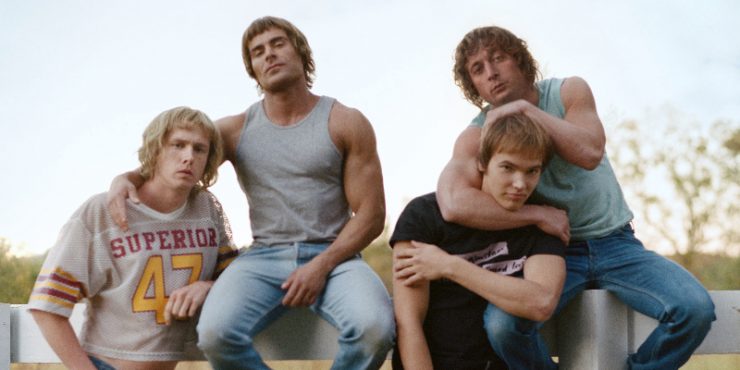It is perhaps not surprising at all that professional wrestling – an entertainment sport that values the operatic details of melodrama – would lend itself to cinematic recreation. The level of performance, physical and emotional, is constantly played to the point of extremity. Darren Aronofsky’s 2008 film The Wrestler contemplated the toll that takes on a man’s body and soul. The Wrestler was a film made with grit, shot in verité style that reflected its protagonist’s rugged state. Sean Durkin’s The Iron Claw instead leans further into that operatic tragedy, telling the story of the Von Erichs, a family known both for its Hall of Fame contribution to the sport of wrestling as well as its Shakespearean level of misfortune and devastation.
Durkin is a filmmaker who crafts brooding tones and ominous dread. His 2011 debut Martha Marcy May Marlene chills the soul unlike any film before or since, and 2020’s The Nest (one of many great films submerged into obscurity by the COVID-induced shutdown) ponders the thought that life’s greatest horror might be within your own home. Those movies work brilliantly with the power of suggestion; what’s scariest about them are the things you don’t see. In The Iron Claw, Durkin gets to be explicit in his depiction, with real life horror living up to the moods he is so good at conjuring. It’s a movie about a dysfunctional family, but it is also in many ways a ghost story, with the central family eternally haunted.
Holt McCallany plays Jack Adkisson, a former college athlete turned professional wrestler who changes his name to Fritz von Erich. In the ring, he is the heel. Nazi-coded, the Von Erich character gets passionate boos from the entire crowd. Jack-turned-Fritz loves the glory of the sport, but he’s mainly motivated by dissatisfaction. He is perpetually bruised, feeling passed over, ever short of the ultimate prize. At first it was his career in football that eluded him, and now its the Worlds Heavyweight title belt that’s out of his grasp. Decades later, he opens his own wrestling business, promoting matches in what is the most successful regional wrestling branch in Texas. His main goal is bringing the title belt home via one of his sons.
The “curse of the Von Erichs” was a notorious phrase even before wrestling became a major part of their lives. The first Von Erich son, Jack Jr., died when he was six. This makes Kevin (a fantastic Zac Efron) the new oldest brother. Then, there’s the tall, charismatic David (Harris Dickinson); the Olympic track-and-field star Kerry (Jeremy Allen White); and the sensitive musician Mike (Stanley Simons). The boys are meticulously (and cruelly) trained by Jack to be jacked wrestling machines, each moment of their lives spent working toward the eventual acquisition of the title belt. Their mother, Doris (Maura Tierney, doing incredible work in limited time and dialogue), watches aloofly, proud but uninterested in the brutality of it all.
Durkin’s script is formatted in a classic rise-and-fall fashion. Its whirling camerawork and late 70s period soundtrack will remind many of Paul Thomas Anderson’s Boogie Nights, which is a different kind of movie about a dysfunctional family. MaCallany’s Jack is a perfect dramatic character, a man so thoroughly flawed that he brings doom upon the very people he loves the most. In Durkin’s film, the “curse” is real, but it’s not a mystical punishment, but the eternal insecurity of a father unwilling to reconcile his own limitations and immortality. The sons, fully brainwashed by his unflinching world philosophy, all find themselves fallen upon his sword. There’s a classical element to it all, but Durkin still imbues the story with haunting modernity.
Efron is an actor who has spent most of his career sprinting tirelessly away from his child star roots, and he’s occasionally chosen difficult projects that ask more from him than he can provide. The Iron Claw feels like the perfect role, giving Efron both a use for his boyish charm and a vessel from his svelte figure. There’s an impossibility to Kevin Von Erich’s body, and the strained vascularity of the muscles are on full display from the very beginning. Efron wears it all like ill-fitting armor, a physical manifestation of his existential burdens. Kevin is a man literally uncomfortable in his own skin, but whose limited worldview prevents him from understanding that. It’s heartbreaking the way Efron plays Kevin’s enlightenment, a discovery that can only come as a consequence of the worst possible outcomes.
The heaviness of the material here could wear on most audiences. There is, in fact, a whole other tragic Von Erich brother cut out of the movie, seemingly to have some control over how depressing the movie would ultimately be. The vastness of the story, spanning decades, means that Durkin doesn’t get to be as precise in his characterizations as he was in his first two features. You’re meant to feel the weight of time, to carry the totality of a family’s collective sorrow. Durkin gets that across on the screen, and with great aplomb, manages to end the film on the most unlikely of up beats. The “happy ending” (such as it is) is pulled beautifully from the depths of the film’s most devastating monologue, but it perfectly encapsulates the film’s central thesis: it’s the overcoming of tragedy that brings our life’s resolutions.
Written and Directed by Sean Durkin










